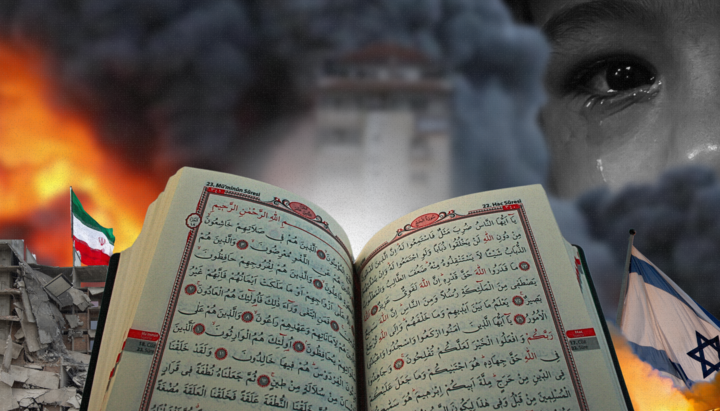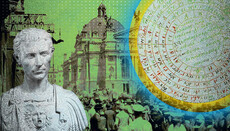Eschatological war: The religious roots of the Israel–Iran conflict

From alliance to a war of annihilation: how religious ideology turned two neighbors into irreconcilable enemies.
On June 13, 2025, Israel launched strikes on Iranian territory, claiming to target facilities related to Iran’s nuclear program. Iran soon responded with a barrage of missiles, leaving Israeli civilians dead and wounded. Tel Aviv retaliated with a storm of fire across the border. The escalation is growing at a geometric pace.
Let us state clearly: the UOJ editorial board consistently and firmly opposes war in all its forms and manifestations, calling for peaceful resolution to all conflicts. However, to understand the unfolding events between Israel and Iran, we must look into the deeper causes of their confrontation.
When the Israeli Air Force struck multiple targets in Iran, international media largely framed it as another episode of Middle Eastern geopolitics. Commentators speculated that Prime Minister Netanyahu was using war to cling to power, or that Israeli leadership was trying to prevent a new nuclear state in the region. But such explanations overlook the essential truth: the Israel–Iran conflict is fundamentally different in nature.
This is not a case of political competition – it is rather a religious war of annihilation.
A doctrine of annihilation as state policy
Anyone following Middle Eastern affairs knows that Iran’s hostile rhetoric against Israel is not occasional or fringe, but systematic and central. Iran’s Supreme Leader, Ali Khamenei, routinely terms Israel as the “illegal and filthy Zionist regime”, a "cancerous tumor in the very heart of the Middle East" or that "it should be wiped off the map/face of the earth”, which is explicitly written (sometimes in Hebrew).
It's noteworthy that these declarations do not come from isolated fanatics but from the country’s top religious and political authorities, and appear as an overt declaration of Iran’s long-term objective.
In 2014, Khamenei tweeted a nine-point plan for eradicating the “Zionist regime.”
Later, on September 9, 2015, he stated, “Some of the Zionists have said that given the results of the nuclear negotiations (between Tehran and the world powers), they were relieved of concerns [they had] about Iran for 25 years, but we tell them that basically, you will not see the next 25 years, and with Allah’s grace, nothing under the name of the Zionist regime will exist in the region by then.”
In 2016, senior IRGC Quds Force commander Ahmad Karimpour declared that Israel could be "destroyed in eight minutes.” He said, “With the facilities and equipment we have, we can raze the Zionist regime to the ground in less than eight minutes if we ever decide to act, based on the Supreme Leader’s orders.”
On January 14, 2017, Minister of Intelligence Hojjat al-Islam Sayyid Hamoud Alavi stated: “Just as Ayatollah Khamenei’s prediction about the US presidential election was realized, his prediction that Israel will be destroyed in 25 years will also materialize.”
Around the same time, IRGC spokesman Ramadan Sharif accused Israel of attacking Muslims and said, “It is a fact that Israel is responsible for any attacks against Muslims; step-by-step, we are nearing the destruction of Israel and the salvation of al-Quds (Jerusalem).”
In January 2021, members of the Iranian parliament introduced a bill titled Iran Responds, comprising 16 articles obligating the government to take measures aimed at “eliminating Israel by March 2041.” The legislation also targets U.S. influence in the region.
The picture is clear: Iran’s leadership openly declares that Israel must be destroyed. What makes this position unique among regional conflicts is that Tehran does not make territorial demands, political conditions, or offers for negotiation. Its only stated goal is Israel’s total physical destruction. Why? What lies at the root of this hatred?
Mahdism as a theological justification for war
Israel’s leadership is far from blameless – consider its bombings of Gaza and Palestine. But is this alone the reason for Iran’s deep hostility?
In fact, no. The roots lie in the eschatological doctrines of Shiite Islam, particularly in the concept of Mahdism. According to this belief, the Mahdi – the final successor of the Prophet Muhammad – will appear at the end of time to defeat the forces of evil. In modern Iranian theology and ideology, Israel is cast as the embodiment of that evil.
Thus, destroying the Jewish state becomes not just a political aim but a religious obligation – a prerequisite for ushering in the messianic age.
This eschatological motivation radically differs from ordinary state conflicts. In typical disputes, compromise is possible – through territorial concessions, economic agreements, or political guarantees. But a religiously driven call for annihilation of the enemy inherently excludes any diplomacy,rules out any negotiation process.
Curiously, it wan't always that way. Before the Islamic Revolution of 1979, Iran and Israel had strong diplomatic and strategic ties. The Shah’s Iran was one of the first Middle Eastern countries to recognize Israel and was long considered a natural ally by Tel Aviv.
Everything changed with the rise of the ayatollahs, who made anti-Israel rhetoric the cornerstone of state ideology. In contrast, Israel has never officially called for Iran’s destruction, passed laws to “wipe it off the map,” or considered exterminating Persians as part of its national doctrine.
Nuclear weapons: Deterrence or destruction?
Iran’s nuclear program gives its religious hatred a terrifying dimension. It is doubtful that Iran’s goal is simply to deter neighboring threats. Tehran could plausibly use its nuclear capability to attempt Israel’s physical destruction.
Moreover, Iran's leadership has indicated it is prepared for “collateral damage” among Palestinians. The regime has repeatedly declared its readiness for martyrdom in the name of jihad, if it advances the “greater goal.”
This theological willingness to suffer massive losses in pursuit of divine ends makes traditional deterrence ineffective. A regime that views its own casualties as a sacred sacrifice in the name of the end of time cannot be swayed by threats of retaliation.
“Am ke-Lavi”: Biblical symbolism in modern warfare
Israel, too, views this war through a religious lens. Its military operation against Iranian targets was codenamed Am ke-Lavi – “A People Like a Lion.” This is a quote from the Book of Numbers: “Behold, the people rise up as a lioness, and as a lion lifts himself up; he shall not lie down until he devour the prey, and drink the blood of the slain.”
The name is no coincidence. It reflects that Israel’s leadership (at least outwardly) views the conflict not as a geopolitical maneuver, but as a “sacred” struggle for survival. These very words – “a people like a lion” – were written by Prime Minister Benjamin Netanyahu in a note left at the Western Wall just days before the strikes on Iran, thereby underscoring the religious significance of the moment.
Regardless of one's stance toward Israel, it is hard to imagine any government sitting idle while a neighboring state develops weapons of mass destruction with the explicit goal of annihilating it. While we may oppose “preemptive strikes” and war itself, Israel’s response follows a basic human – not divine or Christian – logic of national self-preservation.
Especially since diplomacy has failed. In religiously driven conflicts, traditional negotiation is futile – because eschatological logic allows no room for long-term compromise with “the forces of evil.”
The moral dimension of the conflict
In the situation at hand, one thing is clear: modern international law is powerless to resolve conflicts in which religion occupies a central role. When one side is guided by eschatological motivations, no arguments – political, economic, or otherwise – have any effect.
The greatest tragedy is that ordinary civilians on both sides become hostages of their leaders' religious and political ambitions. Many Iranians, who recall with nostalgia the pre-revolutionary era of Iran–Israel cooperation, are now paying the price of their theocratic regime’s fanaticism. Likewise, ordinary Israelis – already being targeted by Iranian airstrikes – will also pay that price.
Conclusions
Let us once again remind our readers: the UOJ is a firm and unwavering advocate for the peaceful resolution of international conflicts. We mourn every victim of war and pray for the swift establishment of a just peace in the Middle East.
Moreover, we categorically oppose injecting religion into any form of military conflict. Simply put, God must not be dragged into the wars of men. Such wars cannot be resolved through ordinary diplomatic channels. When one side views the physical annihilation of its enemy as a sacred duty, the very notion of negotiations becomes meaningless.
Today, one of the most urgent and terrifying questions facing humanity is this: Can the international community find effective tools to stop religious fanatics who gain access to weapons of mass destruction?
The answer to this question will determine not only the fate of the Middle East – but, in a very real sense, the future of all humanity.











